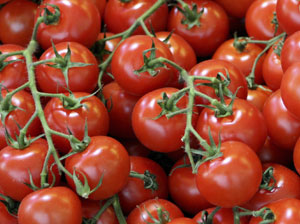Problems with Beans and Tomatoes in 2010
 Question from Claudia:
Question from Claudia:
We live in Corona, CA. We grow tomatoes from seed and also store-bought. Initially, they seem to thrive, but after the first fruit, the lower leaves begin to droop and then turn brown and dry out, look dead. The plants continue to have fruit higher up, and even the fruit on dried up stems ripens. But gradually, starting from the bottom, within weeks the entire plant turns dry and brittle. Our green beans do the same. Homemade compost is all my husband uses. He is so disheartened! Thank you for your reply in advance.
Answer from Pat:
Please don’t be so disheartened. Gardening is a task of trial and error and often fraught with problems. You are not alone. Many people are having trouble with tomatoes and beans this year, and we will get to the bottom of it and find solutions. I am going to consult with our Farm Advisor and see if there has been any work done on problems with beans this year. I think part of it is the swings of temperature we have had. Also, there may be a new bean virus, we do not as yet have a name for. Beans are subject to virus. I have already written considerably on tomato and bean problems so please begin there.
For problems with beans please go to this link: https://patwelsh.com/wpmu/blog/vegetables-fruits/runner-beans-have-stopped-growing/. See if any of the information given there rings a bell.
One thing I did not mention is my fear that people are not aging their compost enough and that it is not getting hot enough to kill pathogens. Another possibility I thought of lately is that if people are now putting all their kitchen waste into compost this could put salt into compost which then could kill plants. Additionally there is the problem with the bagged products this year lacking nitrogen.
Also please look at the instructions on Late Blight and Early Blight in my book. Control tomato diseases early with Serenade. Grow disease resistant varieties. Rotate crops. A new advance in California is to grow grafted tomatoes on disease-resistent root stock as farmers have done in Europe for several years. (More on this subject later.) When I grew tomatoes here I always grew the varieties that are resistant to verticillium wilt, nematodes, and Fusarium wilt. Now people are growing heirlooms many of which are more prone to disease.
Since I wrote that entry on my daughter’s bean problems and also shot a video in her garden I decided the main problem she was having is nematodes. I have made videos on nematodes and also on trouble-shooting in the tomato patch and hope these will soon be posted on my website. (I write the all the content on my blog; my business partner posts all items and he is working on this as fast as he can to keep up.)


Yes, people can bring their bean or any other plant samples for diagnosis to our offices. Whole plants with some soil are ideal, but hard to do in the case of trees. It is also helpful to package the soil separately from the rest of the sample. Pictures can be helpful too, especially where it’s hard to get a sample. We have 2 PhD entomologists to handle the insects, so insects are welcome too, although we only identify plant pests, not pests of people. (Where human health issues are involved people are encouraged to talk to their doctors.)
People can mail or bring samples in. I am at the office at Dept. of Agriculture, County of San Diego, 5555 Overland Ave., Suite 3101, San Diego, CA 92123. If bringing in samples in person, the customer needs to know that the complex entrance has been moved to Farnham St. while all the construction is going on. It is just off Overland (you can’t miss the new 4 story buildings and cranes). There are big blue and green signs to help direct people and free valet parking since the construction has taken over most of the old parking lot. Agriculture is in Building 3, which is very close to the valet station. We’re open 8-5 Monday through Friday.
The other office is at 151 E. Carmel St., San Marcos, CA 92078. The exit off the 78 is Twin Oaks Valley Road. It another county building with several departments there. Agriculture is in the back (the south side). I hope that helps.
I forgot to mention that other counties run Plant Disease Clinics too. Los Angeles, Orange, and Santa Barbara Counties have entomologists and plant pathologists and their Agricultural Commissioner offices. That might help the people reading your blog from those counties. How terrific! Also people can contact the Master Gardeners in every county. Keep up the great work!
Thanks so much, Pat. This is extremely helpful information for all our readers.